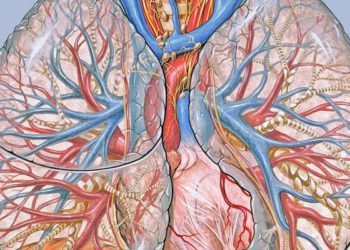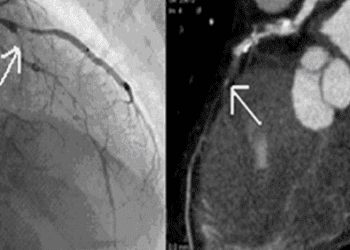Losmapimod does not improve cardiovascular outcomes after myocardial infarction
1. Losmapimod, when administered to patients after a myocardial infarction (MI), was not effective in reducing subsequent severe cardiovascular events, including death.
2. Losmapimod did lower certain biomarkers, such as brain natriuretic peptide (BNP) and C-reactive protein (CRP), though these values tended to return to normal after prolonged treatment.
Evidence Rating Level: 1 (Excellent)
Study Rundown: After an MI, heightened levels of inflammation have been shown to further damage cardiac tissue, leading to poorer cardiovascular outcomes. A novel p38 mitogen-activated protein kinase (MAPK) inhibitor, losmapimod, was shown to reduce certain inflammatory markers after MI in clinical settings. This multisite, randomized controlled trial, sought to determine what effects this therapy might have on cardiovascular outcomes. Results showed that losmapimod, administered for 24 weeks after an MI, was not associated with a reduction in severe cardiovascular events, including subsequent MI, recurrent ischemia leading to revascularization, or cardiovascular death. In addition, many secondary endpoints of poor cardiovascular health remained similarly elevated in both treatment and control groups. Despite stratifying results by sex, age, non-ST elevation myocardial infarction (NSTEMI) or STEMI, prior treatment strategy, and other factors, losmapimod continued to show no clinical benefit over placebo. Despite this lack of clinical efficacy, losmapimod administration was correlated with decreased CRP levels in the acute setting, and reductions in BNP for up to 12 weeks after MI. However, both of these biomarkers returned to the same levels as those in the placebo group by the end of the study. Likewise, there were no differences in other adverse outcomes or side effects. The results of this rigorously designed study strongly suggests that losmapimod monotherapy is unlikely to be clinically beneficial for patients after an MI. However, further studies might explore its use combined with other anti-inflammatory agents.
Click to read the study in JAMA
Relevant Reading: Losmapimod, a novel p38 mitogen-activated protein kinase inhibitor, in non-ST-segment elevation myocardial infarction: a randomised phase 2 trial
In-Depth [randomized controlled trial]: A total of 3490 patients at 322 sites in 34 countries who presented with NSTEMI or STEMI were randomized to receive losmapimod (7.5 mg BID) or placebo for 24 weeks. Exclusion criteria included clinical instability, acute or chronic liver or kidney disease, opportunistic infection, or NYHA class III or higher heart failure at time of MI. There was no difference in primary endpoints of cardiovascular death, recurrent MI, or severe recurrent ischemia requiring revascularization between treatment and placebo groups. Secondary endpoints, including hospitalization for heart failure, stroke, coronary artery disease, or stent thrombosis, were also similar. No differences were observed when patients were grouped by age, sex, prior MI, chronic kidney disease, NSTEMI vs STEMI, prior PCI or CABG, planned versus actual treatment strategy for MI, time from randomization to PCI, or number of predictors of cardiovascular risk. Losmapimod was able to reduce CRP at 4 weeks and BNP at 12 weeks after MI, but both levels returned to placebo group levels after these time points. No difference in adverse events or side effects were noted.
Image: PD
©2016 2 Minute Medicine, Inc. All rights reserved. No works may be reproduced without expressed written consent from 2 Minute Medicine, Inc. Inquire about licensing here. No article should be construed as medical advice and is not intended as such by the authors or by 2 Minute Medicine, Inc.






![Endostatin directly binds androgen receptors to treat prostate cancer [PreClinical]](https://www.2minutemedicine.com/wp-content/uploads/2015/01/Endostatin-75x75.jpeg)
